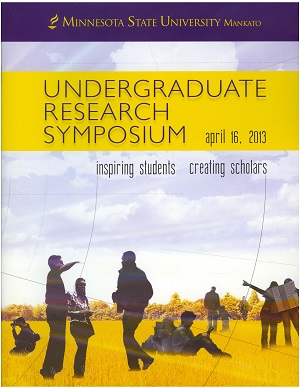An Analysis of the Effectiveness of Collaborate Learning Methodology within Higher Education
Location
CSU 202
Start Date
16-4-2013 3:25 PM
End Date
16-4-2013 4:25 PM
Student's Major
Economics
Student's College
Social and Behavioral Sciences
Mentor's Name
Ihsuan Li
Mentor's Department
Economics
Mentor's College
Social and Behavioral Sciences
Description
This project investigates the long-run educational impact of increased use of non-lecture-based teaching methodology on the quality of university graduates as assessed by post-graduation scores attained on certified public accountant examinations. The study provides quantitative evidence based on actual data, instead of survey results, on whether non-lecture-based learning methodologies improve information retention. The following research questions are asked: Has GPA of graduating seniors improved with the introduction of non-lecture based classroom pedagogy? And if so, did the improved GPA positively impact post-graduate performance on standardized certification exams? To answer these questions, I use actual student data from Minnesota State University, Mankato, as well as CPA exam data obtained from the NASBA. The sample includes the last 20 years of alumni of the Minnesota State University Mankato. In the data set, I include unique, anonymous, identifying numbers for each graduate, as well as their major, graduation year, GPA, and percentage scores on attempted post-graduation certification exams. Other socio-economic, institutional, and personal background data pieces are used as control variables. The analysis of the data is performed at three levels: simple summary statistics; tests of sample mean and differences in means; tests of sample proportion and differences in proportions; and lastly, multiple variable regression analysis (Ordinary Least Square method). The analysis is performed using Stata software V.11. While in-class benefits from non-lecture-based learning techniques have been documented in controlled studies, long run information retention may be compromised in the process.
An Analysis of the Effectiveness of Collaborate Learning Methodology within Higher Education
CSU 202
This project investigates the long-run educational impact of increased use of non-lecture-based teaching methodology on the quality of university graduates as assessed by post-graduation scores attained on certified public accountant examinations. The study provides quantitative evidence based on actual data, instead of survey results, on whether non-lecture-based learning methodologies improve information retention. The following research questions are asked: Has GPA of graduating seniors improved with the introduction of non-lecture based classroom pedagogy? And if so, did the improved GPA positively impact post-graduate performance on standardized certification exams? To answer these questions, I use actual student data from Minnesota State University, Mankato, as well as CPA exam data obtained from the NASBA. The sample includes the last 20 years of alumni of the Minnesota State University Mankato. In the data set, I include unique, anonymous, identifying numbers for each graduate, as well as their major, graduation year, GPA, and percentage scores on attempted post-graduation certification exams. Other socio-economic, institutional, and personal background data pieces are used as control variables. The analysis of the data is performed at three levels: simple summary statistics; tests of sample mean and differences in means; tests of sample proportion and differences in proportions; and lastly, multiple variable regression analysis (Ordinary Least Square method). The analysis is performed using Stata software V.11. While in-class benefits from non-lecture-based learning techniques have been documented in controlled studies, long run information retention may be compromised in the process.
Recommended Citation
Petersen, Matthew. "An Analysis of the Effectiveness of Collaborate Learning Methodology within Higher Education." Undergraduate Research Symposium, Mankato, MN, April 16, 2013.
https://cornerstone.lib.mnsu.edu/urs/2013/oral-session-15/2




